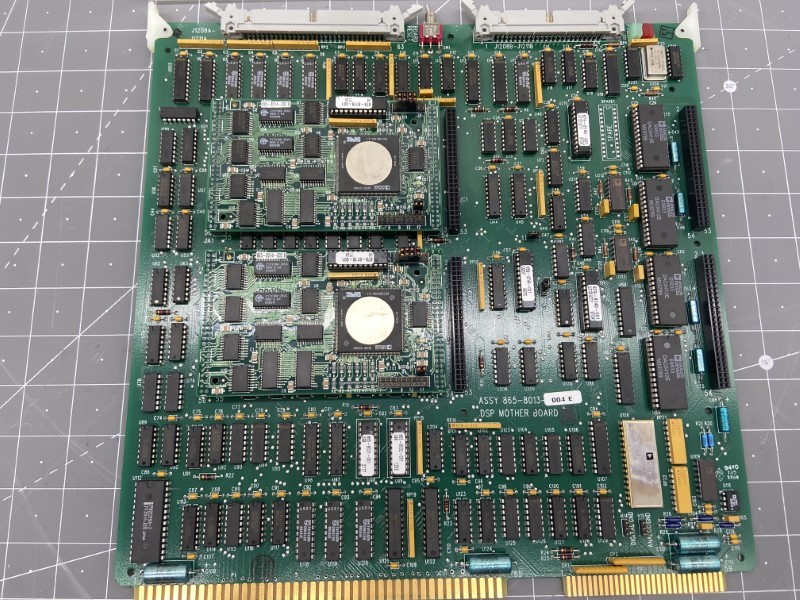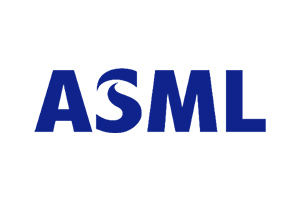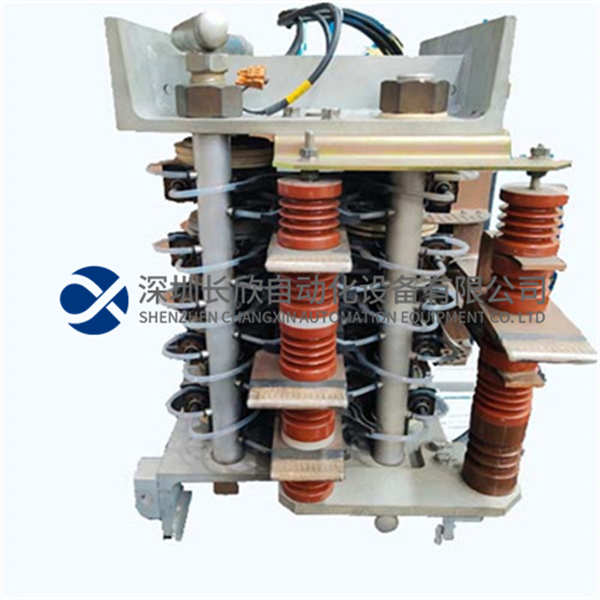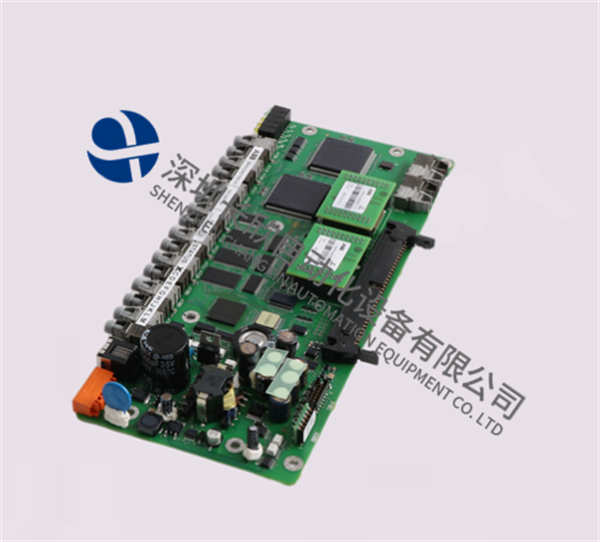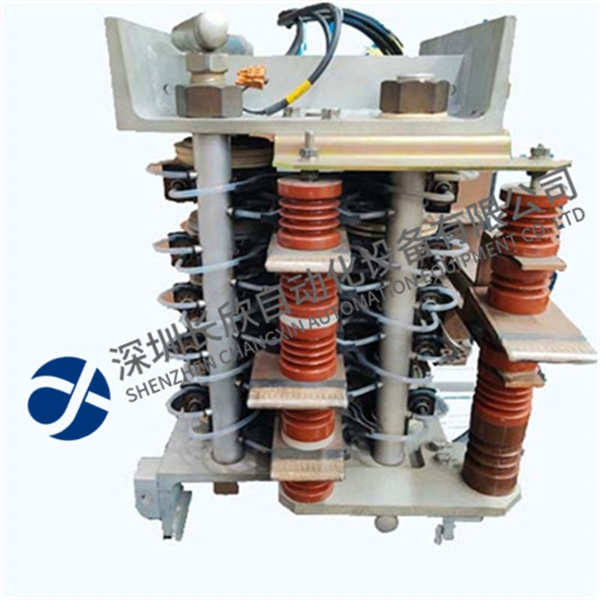描述
产品简要说明
ASML 865-8013-004是ASML专为极紫外(EUV)光刻机设计的高精度光学准直模块,核心特性包括:
亚纳米级定位精度:采用磁悬浮驱动与压电陶瓷补偿技术,定位误差≤0.05nm。
多波段兼容性:支持13.5nm EUV激光与可见光校准光源的双模式切换。
洁净室级稳定性:通过Class 1洁净室认证,振动敏感度<1nm/√Hz。
产品详细说明
1.技术架构与核心功能
光学准直系统:
由多片超精密反射镜(表面粗糙度Ra≤0.1nm)与自适应透镜组成,实现激光波前畸变补偿。
集成波前传感器(WFS)与闭环控制算法,动态校正光路偏差,响应时间<1μs。
驱动与定位:
采用磁悬浮无接触驱动技术,消除机械摩擦导致的定位漂移。
压电陶瓷微动平台提供纳米级分辨率(0.1nm步进精度)。
环境适应性:
真空封装设计,内部气压<1e-6 mbar,减少空气折射率波动影响。
铝合金框架与钛合金镜座,热膨胀系数(CTE)匹配光刻机基座(1.5ppm/℃)。
2.性能突破
多波段协同校准:
支持13.5nm EUV激光与633nm HeNe激光的混合校准模式,校准效率提升40%。
抗干扰能力:
屏蔽层采用铜-钛合金复合结构,电磁屏蔽效能达70dB(1MHz~1GHz)。
能效优化:
动态功耗管理技术,待机功耗≤5W,校准过程功耗≤25W。
技术规格:ASML 865-8013-004
参数项规格描述
定位精度≤0.05nm(RMS)
波前畸变控制PV值≤0.02λ 13.5nm
工作温度20℃±0.1℃(恒温控制)
真空环境内部气压<1e-6 mbar
驱动方式磁悬浮+压电陶瓷复合驱动
功耗≤25W(校准模式)
核心价值与性能亮点
1.极端环境适应性
真空环境稳定性:采用无油润滑磁悬浮轴承,避免油污污染光学元件。
低温恒温设计:内置珀尔帖温控模块,温度波动≤0.01℃,确保光学元件形变<0.01nm。
2.多场景扩展性
跨代兼容性:适配ASML NXE 3600D及后续High-NA EUV光刻机。
工业互联网集成:预留OPC UA接口,支持与MES系统实时数据交互。
3.全生命周期成本优化
自清洁功能:内置离子风清洁系统,减少人工维护频率。
模块化更换:反射镜与驱动单元可独立更换,维修成本降低60%。
Product brief description
ASML 865-8013-004 is a high-precision optical collimation module designed by ASML for extreme ultraviolet(EUV)lithography machines.The core features include:
Sub-nano-level positioning accuracy:Magnetic levitation drive and piezoelectric ceramic compensation technology are used,and the positioning error is≤0.05nm.
Multi-band compatibility:Supports dual mode switching between 13.5nm EUV laser and visible light calibration light source.
Clean room level stability:passed Class 1 clean room certification,vibration sensitivity<1nm/√Hz.
Product details
1.Technical architecture and core functions
Optical collimation system:
It consists of multiple ultra-precision reflectors(surface roughness Ra≤0.1nm)and adaptive lenses to achieve laser wavefront distortion compensation.
Integrated wavefront sensor(WFS)and closed-loop control algorithm,dynamically correct optical path deviation,and response time<1μs.
Driver and Positioning:
Magnetic levitation contactless drive technology is adopted to eliminate positioning drift caused by mechanical friction.
The piezoelectric ceramic micro-movement platform provides nanoscale resolution(0.1nm step accuracy).
Environmental adaptability:
Vacuum package design,internal air pressure<1e-6 mbar,reducing the influence of air refractive index fluctuations.
Aluminum alloy frame and titanium alloy mirror seat,thermal expansion coefficient(CTE)matches the base of the lithography machine(1.5ppm/℃).
2.Performance breakthrough
Multi-band collaborative calibration:
Supports a hybrid calibration mode of 13.5nm EUV laser and 633nm HeNe laser,and the calibration efficiency is improved by 40%.
Anti-interference ability:
The shielding layer adopts a copper-titanium alloy composite structure,and the electromagnetic shielding effect is up to 70dB(1MHz~1GHz).
Energy efficiency optimization:
Dynamic power consumption management technology,standby power consumption≤5W,calibration process power consumption≤25W.
Technical Specifications:ASML 865-8013-004
Parameters Specification Description
Positioning accuracy≤0.05nm(RMS)
Wavefront distortion control PV value≤0.02λ 13.5nm
Working temperature:20℃±0.1℃(constant temperature control)
Vacuum environment Internal air pressure<1e-6 mbar
Drive mode Magnetic levitation+piezoelectric ceramic composite drive
Power consumption≤25W(calibration mode)
Core Valuesand Performance Highlights
1.Extreme environmental adaptability
Vacuum environment stability:oil-free lubricated magnetic levitation bearings are used to avoid oil pollution from contaminating optical components.
Low temperature constant temperature design:built-in Peltier temperature control module,temperature fluctuation is≤0.01℃,ensuring the deformation of the optical component<0.01nm.
2.Multi-scene scalability
Cross-generation compatibility:adapted to ASML NXE 3600D and subsequent High-NA EUV lithography machines.
Industrial Internet integration:reserves OPC UA interface and supports real-time data interaction with MES systems.
3.Full life cycle cost optimization
Self-cleaning function:built-in ion air cleaning system to reduce the frequency of manual maintenance.
Modular replacement:The mirror and the drive unit can be replaced independently,reducing the maintenance cost by 60%.

